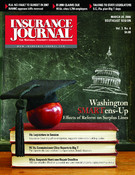supports “Floridians for Lower Insurance Costs,” a coalition of concerned citizens, and opposes the reinstatement of the no-fault auto insurance law and will state its position to the Florida Legislature, which continues through May 5. Legislators began their sessions March 7.
David Reddick, NAMIC senior state advocacy manager said NAMIC, which represents 125 member companies doing business in Florida, supports FLIC, a group concerned about growing waste, fraud and abuse in the no-fault system. FLIC’s Web site, www.lowerinsurancecosts.com, describes its position.
“It’s clear to us that the no-fault system isn’t working in Florida,” Reddick said. “The average Florida family is paying at least $250 a year more than it should for auto insurance.”
Three years ago, the Florida Legislature enacted a provision calling for the no-fault law to sunset in 2007 unless lawmakers reenacted it during the 2006
legislative session. Senate Pro-posed Bill 7094 has been introduced and forwarded to
the Senate Banking and Insur-ance Committee. The bill proposes a medical fee schedule for PIP set at a specified percentage above the Medicare fee schedule and eliminates the contingency risk multiplier applied to attorney fee awards.
“We know several auto insurers favor the reforms contained in SPB 7094, but once the legislative debate gets under way, the reenactment provisions are likely to be watered down so much that substantive reform isn’t going to be possible,” Reddick said. “NAMIC favors letting the law sunset next year.”
Reddick said PCB IN 06-01, in the House Insurance Committee proposes several changes to Citizens Property Insurance Corporation, the insurer of last resort, including new benchmarks for determining Citizens’ rates and a prohibition on insuring single-family residences with a value in excess of $1 million.
“The bill contains a provision requiring insurers to perform all servicing and claims functions on the windstorm portion of homeowner’s policies,” Reddick said. “That will be problematic for some members.”
A second provision would create a “flex band” for personal lines coverage where a filed rate would be considered excessive if it represented more than a 10 percent statewide average change from the then-
current lawful rate and no more than a 25 percent change in any one rating territory.
“It is too early in the legislative process to know if this provision will stay in the bill,” Reddick said, adding, “Based on past sessions, it is unlikely to survive.”
Was this article valuable?
Here are more articles you may enjoy.


 AIG Underwriting Income Up 48% in Q4 on North America Commercial
AIG Underwriting Income Up 48% in Q4 on North America Commercial  How One Fla. Insurance Agent Allegedly Used Another’s License to Swipe Commissions
How One Fla. Insurance Agent Allegedly Used Another’s License to Swipe Commissions  Allstate CEO Wilson Takes on Affordability Issue During Earnings Call
Allstate CEO Wilson Takes on Affordability Issue During Earnings Call  Q4 Global Commercial Insurance Rates Drop 4%, in 6th Quarterly Decline: Marsh
Q4 Global Commercial Insurance Rates Drop 4%, in 6th Quarterly Decline: Marsh 


